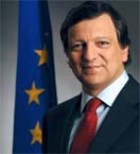Barroso to attend eurogroup meeting amid widening EU rifts
 Brussels - The head of the European Union executive, Jose Manuel Barroso, was to make a rare appearance at Monday's meeting of eurogroup finance ministers amid deep divisions on how to deal with the economic and financial crises.
Brussels - The head of the European Union executive, Jose Manuel Barroso, was to make a rare appearance at Monday's meeting of eurogroup finance ministers amid deep divisions on how to deal with the economic and financial crises.
The informal dinner-time talks in Brussels are regularly attended by the EU's economic and monetary affairs commissioner, Joaquin Almunia, and European Central Bank President Jean-Claude Trichet.
And while commission officials insist that Barroso's presence will not turn them into a "crisis meeting", there is growing frustration in Brussels at member states' failure to agree on a common response to both the global credit crunch and to one the worst economic downturn since World War II.
Partly to counter French claims that it is being too "passive", the Czech presidency of the EU said Monday it was planning an emergency summit of the bloc's 27 leaders for the end of the month.
The informal gathering would prepare the groundwork for the EU's regular spring council, which is traditionally devoted to economic issues.
The March 19-20 summit would assess whether a proposed European-wide 200-billion-euro (257-billion-dollar) economic stimulus package is sufficient to help deal with the recession.
EU officials are also keen to avoid a repeat of last week's scene, when French President Nicolas Sarkozy infuriated Prague by suggesting that Citroen and Peugeot should relocated their car plants in the Czech Republic to France.
Another area in which the 16 eurozone governments remain divided concerns the disposal of so-called "toxic assets" held by banks.
British plans to insure such assets using public money, for instance, have received a lukewarm reception from other European treasuries.
And so have calls from Italy for the creation of a euro bond market to finance the states' rapidly increasing budget deficits.
On February 18, the European Commission is expected to formalize infringement procedures against six more EU countries whose budget deficits exceeded the agreed limit of 3 per cent of gross domestic product in 2008.
Four of these - France, Spain, Greece and Ireland - share the common European currency, while non-eurozone members Britain, Romania, Hungary and Latvia also face excessive deficit procedures.
Malta was the ninth EU country to have broken the EU Stability and Growth Pact's 3-per cent-limit on budget deficits last year.
The eurogroup's chairman, Luxembourg Finance and Prime Minister Jean-Claude Juncker, warned ahead of Monday's meeting that ministers would now have to agree on a common debt-reduction strategy.
And with Almunia insisting that the stability pact will not be changed, the discussions on Monday were expected to focus on how long countries should be allowed to go on breaching the rules, given the difficult economic climate.
Meanwhile, calls for the creation of a European bond have been fuelled by the increasing spread in interest rates that different eurozone governments have to pay in order to convince investors to finance their debt.
The interest paid on 10-year government bonds, for instance, currently varies from 3.36 per cent in Germany to 5.69 per cent in Greece.
Germany, which is seen as Europe's most reliable borrower, is unwilling to see the attractiveness of its triple-A bonds being diluted by lower-rated Greek, Italian, Spanish or Portuguese bonds.
Speaking on German radio Monday, Juncker once again played down speculation that some of the eurozone's weakest members may default on their debt. But he also warned that rich countries should be prepared to help other countries in need. (dpa)